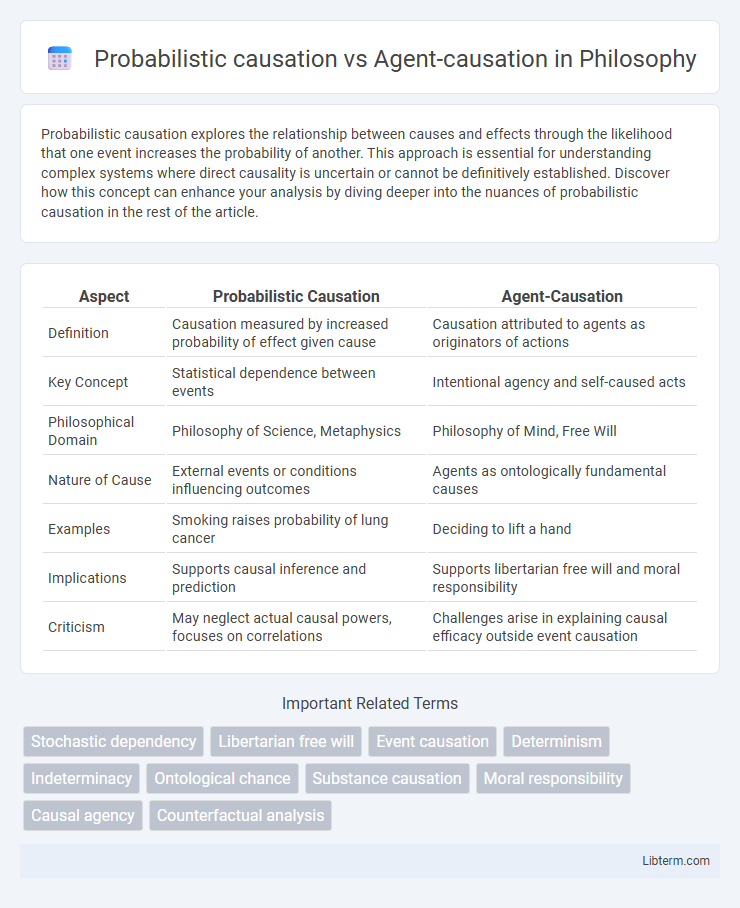Probabilistic causation explores the relationship between causes and effects through the likelihood that one event increases the probability of another. This approach is essential for understanding complex systems where direct causality is uncertain or cannot be definitively established. Discover how this concept can enhance your analysis by diving deeper into the nuances of probabilistic causation in the rest of the article.
Table of Comparison
| Aspect | Probabilistic Causation | Agent-Causation |
|---|---|---|
| Definition | Causation measured by increased probability of effect given cause | Causation attributed to agents as originators of actions |
| Key Concept | Statistical dependence between events | Intentional agency and self-caused acts |
| Philosophical Domain | Philosophy of Science, Metaphysics | Philosophy of Mind, Free Will |
| Nature of Cause | External events or conditions influencing outcomes | Agents as ontologically fundamental causes |
| Examples | Smoking raises probability of lung cancer | Deciding to lift a hand |
| Implications | Supports causal inference and prediction | Supports libertarian free will and moral responsibility |
| Criticism | May neglect actual causal powers, focuses on correlations | Challenges arise in explaining causal efficacy outside event causation |
Introduction to Causation Theories
Probabilistic causation analyzes causal relationships through statistical correlations and likelihoods, emphasizing how causes increase the probability of effects within complex systems. Agent-causation theory centers on the idea that agents themselves exert causal power, highlighting intentional actions as fundamental sources of causation. These contrasting frameworks underpin foundational debates in causation theories, shaping perspectives in philosophy, law, and artificial intelligence.
Defining Probabilistic Causation
Probabilistic causation defines causal relationships through statistical correlation, where the presence of one event increases the likelihood of another event occurring. This concept relies on conditional probabilities, emphasizing that causes raise the probability of effects without guaranteeing them with certainty. It contrasts with deterministic views by accommodating uncertainty and variability inherent in complex systems and real-world scenarios.
Understanding Agent-Causation
Agent-causation refers to the concept that agents, typically conscious beings, have the inherent power to initiate actions independent of deterministic or probabilistic causal chains, emphasizing intentionality and free will. Unlike probabilistic causation, which explains events through likelihoods and statistical dependencies, agent-causation centers on the agent as the direct source of causation rather than external conditions or chance. Understanding agent-causation involves exploring how agents can be considered prime movers capable of causing effects without being wholly governed by prior states or probabilistic tendencies.
Historical Background of Causation Debates
Probabilistic causation emerged in the mid-20th century as philosophers like Reichenbach and Suppes emphasized statistical correlations to explain causal relations, contrasting traditional deterministic views. Agent-causation, rooted in Aristotelian metaphysics and revived by contemporary philosophers such as Roderick Chisholm, focuses on agents as the originating sources of causal power, emphasizing free will. The historical debate reflects a shift from classical deterministic causation toward more nuanced accounts incorporating chance, agency, and metaphysical considerations.
Key Differences Between Probabilistic and Agent-Causation
Probabilistic causation interprets causes as events that increase the likelihood of an effect occurring, emphasizing statistical correlations and chance dependencies. Agent-causation centers on autonomous agents intentionally causing effects through their actions, highlighting volition and purposeful intervention. Key differences include the reliance on statistical probabilities in probabilistic causation versus the emphasis on free will and intentionality in agent-causation frameworks.
Philosophical Implications of Each Model
Probabilistic causation emphasizes causality through likelihood and statistical correlations, raising philosophical questions about determinism and the predictability of events in a seemingly indeterminate universe. Agent-causation highlights the role of conscious agents as originators of causal chains, supporting arguments for free will and moral responsibility by attributing causality to deliberate actions rather than random chance. Each model challenges traditional notions of causality by either quantifying uncertainty or affirming autonomous agency, thereby shaping debates on metaphysics, ethics, and the nature of human action.
Probabilistic Causation in Science and Statistics
Probabilistic causation in science and statistics quantifies the likelihood of one event influencing another, emphasizing correlation and conditional probabilities rather than deterministic outcomes. This approach underpins methodologies such as Bayesian networks and Granger causality, enabling researchers to infer causal relationships from observational data despite inherent uncertainty. Statistical tools harness probabilistic causation to model complex systems where multiple variables interact, allowing for predictions and hypothesis testing grounded in probability distributions.
Agent-Causation in Ethics and Free Will
Agent-causation in ethics emphasizes the role of autonomous agents as the originators of actions, highlighting intentionality and moral responsibility. Unlike probabilistic causation, which relies on statistical correlations and external events to explain behavior, agent-causation asserts that agents possess the power to cause actions independently of prior events or deterministic factors. This perspective supports libertarian free will by positing that moral agents can initiate new causal chains, grounding ethical accountability in individual choice and control.
Challenges and Criticisms of Both Approaches
Probabilistic causation faces challenges in distinguishing correlation from true causation, often criticized for its reliance on statistical associations that may overlook underlying mechanisms. Agent-causation, emphasizing the role of individual agents as originators of actions, struggles with explaining how free will operates within deterministic or indeterministic frameworks, raising debates about metaphysical assumptions. Both approaches are criticized for their difficulties in providing clear, testable criteria for causality, limiting their applicability in empirical research and philosophical explanation.
Future Directions in Causation Theory
Future directions in causation theory emphasize integrating probabilistic causation with agent-causation frameworks to better model complex decision-making scenarios. Advances in machine learning and causal inference techniques seek to clarify the interplay between stochastic causes and intentional agents, enhancing predictive accuracy and explanatory power. Exploring hybrid models that combine statistical regularities with normative aspects of agency will drive innovations in philosophy, artificial intelligence, and cognitive science.
Probabilistic causation Infographic

 libterm.com
libterm.com